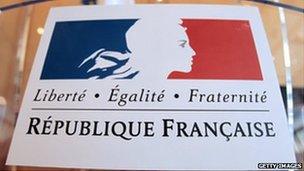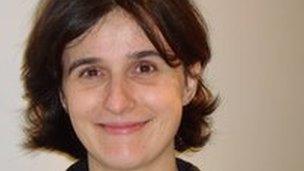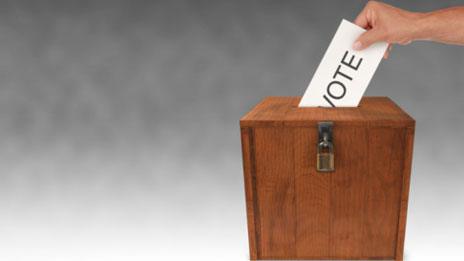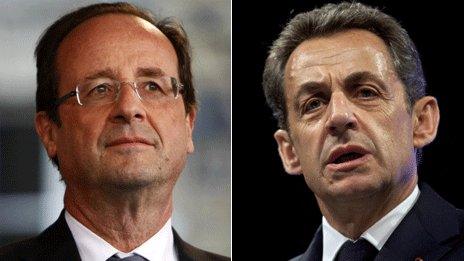Why are the French getting an 'MP for London'?
- Published

This is the first time French citizens living abroad will have their own MPs
French citizens in the UK will for the first time be able to vote for an MP, with the creation of a Northern Europe constituency in the French parliament. What role will London play?
London is home to the majority of the vibrant UK French population for whom the capital is not just a city of transit.
They will soon be represented by a new French MP for the recently established Northern Europe constituency comprising the UK, Ireland, Scandinavia and the Baltic states.
It is difficult to measure the exact number of French people living in the British capital. Over 120,000 are officially registered at the French consulates in London and Edinburgh, but not everybody decides to register and other London estimates put the French population at anywhere between 300,000 and 400,000 citizens.
London could hold the key to victory for any candidate as it has the largest concentration of French people across the whole constituency.
"All of the main parties have chosen candidates based in London," says Philippe Marliere, professor of French and European politics at University College London.
"It's going to be a London contest."
Of the 20 official candidates for the seat, nine are based in London, and a further three live in other regions of the UK.
'Key issue'
Although the French have long had a tradition of MPs from their overseas territories, this is the first time France will allow elected MPs for its expat population to have a seat in parliament.
The decision to create new constituencies for the French abroad was taken by former president Nicolas Sarkozy, whose government passed legislation in 2008 to give them the right to choose their own MPs.

The French already have expat representatives in the Senate
Prof Marliere argues this can be seen a political move by the right to boost votes. Traditionally, the French abroad are less likely to support the left, even if the gap is narrowing in the UK.
Statistics from the French Ministry of the Interior show that the majority (53.05%) of overseas French citizens voted for right-wing candidate Mr Sarkozy in the 2012 presidential election.
But French people in the UK bucked this trend for the first time by voting for Socialist candidate Francois Hollande - though Mr Sarkozy won almost 52% of the second round vote in London.
Party politics aside, Prof Marliere says there are more and more French people living abroad. They can encounter problems with the education, pension, tax, social welfare and health systems in their host country, issues that an expat MP could help them with.
This is reflected in the official manifestos of the candidates, which also mention the challenges faced by French people abroad in business.
But Prof Marliere says that the "key issue" for the UK-based candidates is education, as French families are keen to send their children to French schools.
Providing a French education for their children can be costly for parents and French-speaking schools are oversubscribed.
Because of this, the French embassy, teachers and parents have been working to deal with the shortage of places, opening a new school in Kentish Town, London, last September, says Frederique Brisset, headmistress of L'Ecole des Petits and L'Ecole de Battersea.
"The choice of French schools is limited and there are fundamental differences between the French curriculum and the British curriculum."
"French schools are not free," says Prof Marliere. "Although the French state subsidises education by sending French teachers, the rest is not paid for by the state."
This issue is not going away as within the UK, the make-up of the French community is changing. It is getting younger, and therefore more likely to have children.
In addition to those working in the financial sector and employed by international companies, the UK's French population now includes "students, people in the service industries, public servants and young families", says Prof Marliere.
French Londoners
Clelia-Elsa Froguel, a 26-year-old consultant born in France, is part of this younger generation.
She says the creation of an expat MP enables the voices of French emigrants to be heard in the French parliament.

Muriel Demarcus says that it is difficult to see how the French "MP for London" will change anything
"We are French Londoners, not expats," she says. "The election of an MP for us is extremely important."
While she can vote in the French presidential elections, up until now she did not vote in the French parliamentary elections because she felt she was "not represented."
And David Medioni, a political journalist based in Paris, points out that French people in France view it as "normal" that expats should have some political say.
'More and more British'
But others are less than enthusiastic about the idea, arguing that the MP will have little impact as the French abroad are not the government's priority.
Prof Marliere says it is difficult to see how the French abroad can place demands on the government, as many do not pay taxes in France.
He asks: "Why would the government in France supplement our life choices?"
And Muriel Demarcus, a 39-year-old business owner, says the introduction of an expat French MP is unlikely to change anything.
"After four or five years you turn a corner and you become more and more British. I don't think we are French any more."
The successful candidate will sit in the French National Assembly in Paris and will have the same duties as any other French MP, representing a vast constituency stretching across 1.5m sq miles (4m sq km).
Prof Marliere expects that the elected representative will divide their time between the French capital and their home country, making frequent trips to other regions.
Although the figures are disputed, the London population has grown so big that it is sometimes referred to as France's sixth city. As a result, French people in other European countries, such as 22-year-old Maite Delvarre from Stockholm, say that the views of non-UK based constituents won't be heard.
"The culture in the UK and the Nordic countries is not the same. That's why we need somebody else here."
Even for experts like Prof Marliere, the outcome of the election is difficult to predict.
"It's totally new. Nobody knows what is going to happen."
- Published24 April 2012

- Published22 April 2012
